World

Former US President George H.W. Bush is dead at 94
George H.W. Bush, who in one term as president reasserted the U.S. as the world's lone superpower, rallying an international coalition against Iraq's Saddam Hussein in the first Gulf War and presiding over the fall of the Berlin Wall and subsequent collapse of the Soviet Union, died on Friday. He was 94.
The announcement of his passing was made in a statement by his son, former President George W. Bush.
"Jeb, Neil, Marvin, Doro and I are saddened to announced that after 94 remarkable years, our dear Dad has died," his son said in a statement released Friday night.
"George H.W. Bush was a man of the highest character and the best dad a son or daughter could ask for. The entire Bush family is deeply grateful for 41's life and love, for the compassion of those who have cared and prayed for Dad, and for the condolences of our friends and fellow citizens," the statement read.
Grandson George P. Bush said on Twitter Friday night, "He was more than a great man; he was a good man. His courage was matched by his compassion; and his dedication to country was equaled only by his devotion to his family."
One of the most experienced public servants in U.S. history, Bush served two terms as vice president under Ronald Reagan before becoming president in 1989, capping off a career that included stints as director of the CIA and U.S. ambassador to China and the U.N. in the 1970s.
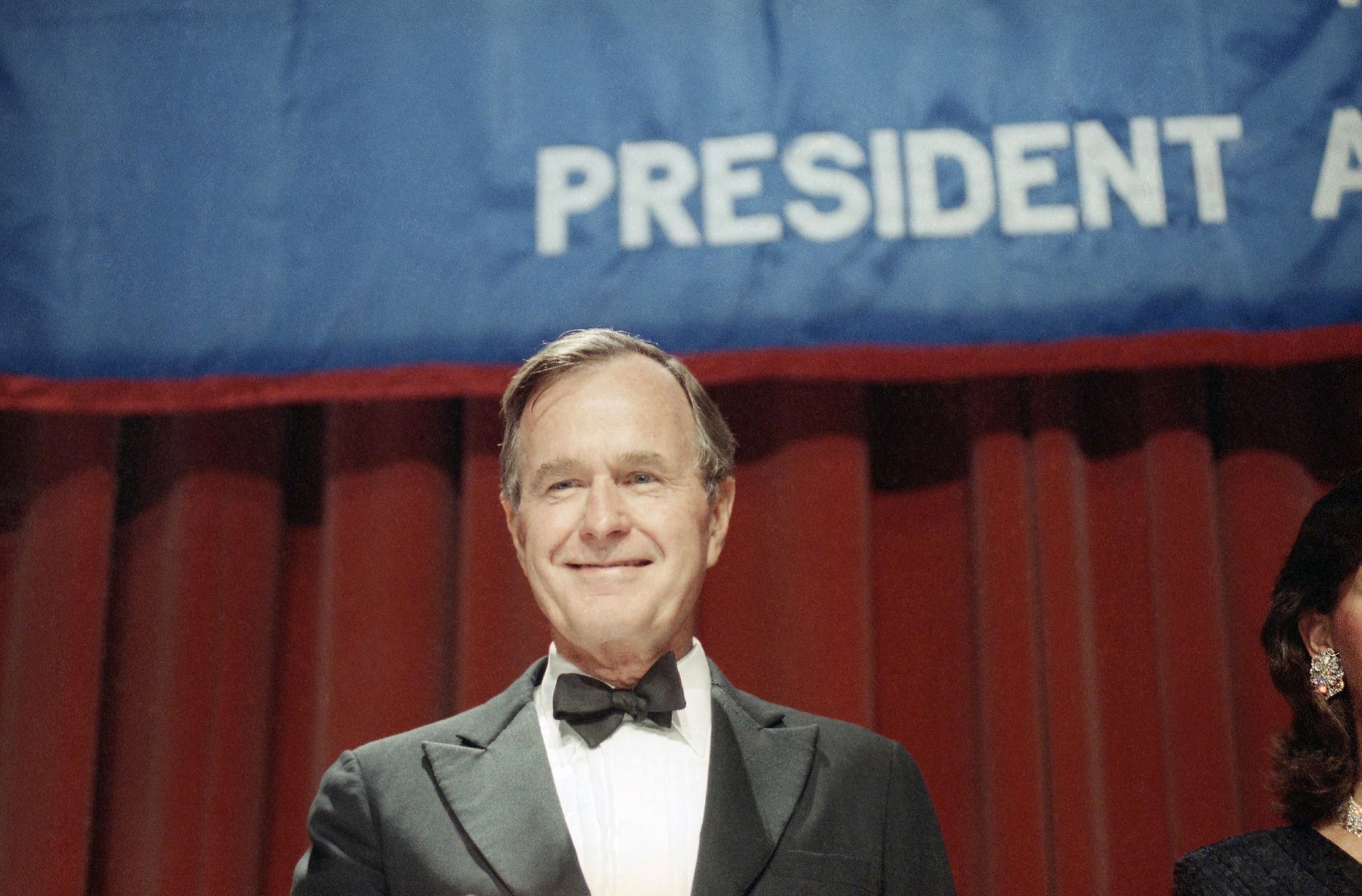 President George H.W. Bush smiles after he was introduced at the New York State Republican dinner at the Waldorf-Austria Hotel on June 22, 1989 in New York.Rick Bowmer / AP file
President George H.W. Bush smiles after he was introduced at the New York State Republican dinner at the Waldorf-Austria Hotel on June 22, 1989 in New York.Rick Bowmer / AP file
A longtime pillar of the moderate wing of the Republican Party — he was national chairman after the Watergate scandal left the GOP in disarray — Bush lent establishment credentials to Reagan's conservative insurgency, becoming his running mate in 1980 after losing the presidential nomination to him.
But for all of the foreign policy successes of Bush's lone term in the White House, it was a basic domestic issue that effectively undercut his shot at a second: his decision to raise taxes to address a deficit that had exploded under Reagan. Conservatives cried heresy, and repercussions still ripple through the GOP today.
Serving as president from 1989 to 1993, Bush and his wife, Barbara, who died in April, remained prominent public figures long afterward. They stood apart as a genial reminders of a political era that many Americans preferred to recall as more bipartisan and cooperative than perhaps it really was.
President Donald Trump and first lady Melania Trump said Bush led the nation with sound judgement, common sense and unflappable leadership.
"Through his essential authenticity, disarming wit, and unwavering commitment to faith, family, and country, President Bush inspired generations of his fellow Americans to public service—to be, in his words, “a thousand points of light” illuminating the greatness, hope, and opportunity of America to the world," they said in a statement.
With the election of George W. Bush as the 43rd president in 2000, the Bushes became the second father-son set to serve as commander in chief — John Adams and John Quincy Adams being the first.
The Bush political dynasty began decades before, with the elder Bush's father, Prescott Bush, a Wall Street banker, representing Connecticut in the U.S. Senate from 1952 to 1963.
An accomplished athlete throughout his life — Bush played first base for Yale University teams that twice made the College World Series — Bush celebrated his 90th birthday by taking a tandem skydive, even though by then he was using a wheelchair because of a disease similar to Parkinson's.
He had been in and out of hospitals several times in recent years, including a stay in the intensive care unit for shortness of breath and pneumonia in January 2017, when President Donald Trump was inaugurated.
At his wife's funeral on April 21, the gregarious and polite former president shook the hands of hundreds of mourners. He went into the hospital days later with what doctors said was an infection.
Although born into privilege, George Herbert Walker Bush looked for opportunities to serve early in life. At 18, he defied his parents and joined the military after the attack on Pearl Harbor in December 1941. He was among the youngest pilots in the Navy and was shot down over the Pacific and was rescued by a passing submarine.
He returned home to marry his sweetheart, Barbara Pierce, and the couple settled in Texas, where he worked in the oil business. They had six children.
Bush made his first bid for office in 1964, running for the U.S. Senate in Texas as a Republican, like his father. He didn't win, but went on to secure a House seat two years later and ran again for Senate in 1970 at the urging of President Richard M. Nixon. Again, he was unsuccessful — but Nixon rewarded Bush by appointing him ambassador to the United Nations.
It would be the first in a series of positions at the pinnacle of American power. He was appointed in 1973 as chairman of the Republican National Committee, tasked with cleaning up the party's mess from the Watergate scandal, and President Gerald Ford rewarded Bush by appointing him U.S. envoy to China and then director of the Central Intelligence Agency.

French President Macron calls nationalism a 'betrayal of patriotism'
French President Emmanuel Macron tore into “nationalism” in an apparent jab at President Trump during his Armistice Day remarks in Paris.
Speaking Sunday at the Arc de Triomphe beside Trump and other world leaders, Macron decried nationalism as “a betrayal of patriotism.”
“Patriotism is the exact opposite of nationalism,” Macron said. “Nationalism is a betrayal of patriotism. By saying our interests first ... we erase what a nation holds dearest, what gives it life, what gives it grace, and what is essential: its moral values."
Trump has faced criticism for referring to himself as a nationalist, comments that he doubled down on last week during a press conference.
When asked about his use of the phrase, which often has racist connotations due to the use of “white nationalist,” Trump said “we have to straighten out our country first.”
He then criticized the reporter, Yamiche Alcindor of "PBS NewsHour", saying her question was racist.
Macron’s comments on Sunday came after the White House canceled Trump’s planned visit to a U.S. military cemetery in northern France due to bad weather.
The move drew a steady stream of domestic and international criticism.
Upon landing in Paris days earlier, Trump also knocked Macron in a tweet, calling the French president’s suggestion of a “true, European army” to defend itself without relying on the U.S. “very insulting.”
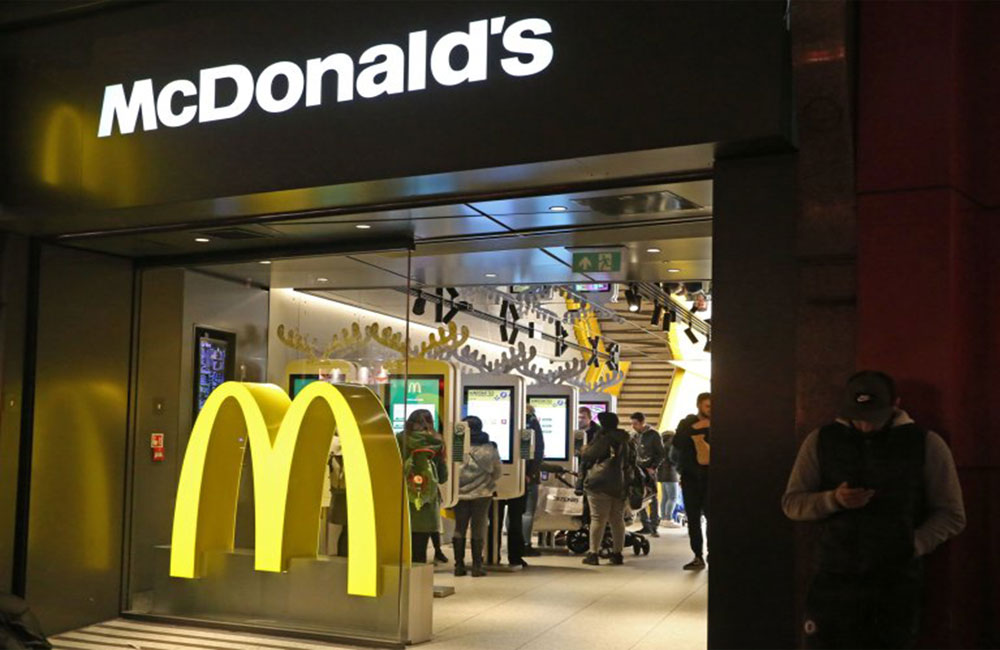
Poo found on every McDonald’s touchscreen tested
Traces of faeces have been found on every single McDonald’s touchscreen swabbed in an investigation by metro.co.uk.
Samples were taken from the new machines that have been rolled out at restaurants across the country – every one of them had coliforms.
Senior lecturer in microbiology at London Metropolitan University Dr Paul Matewele said: ‘We were all surprised how much gut and faecal bacteria there was on the touchscreen machines. These cause the kind of infections that people pick up in hospitals.
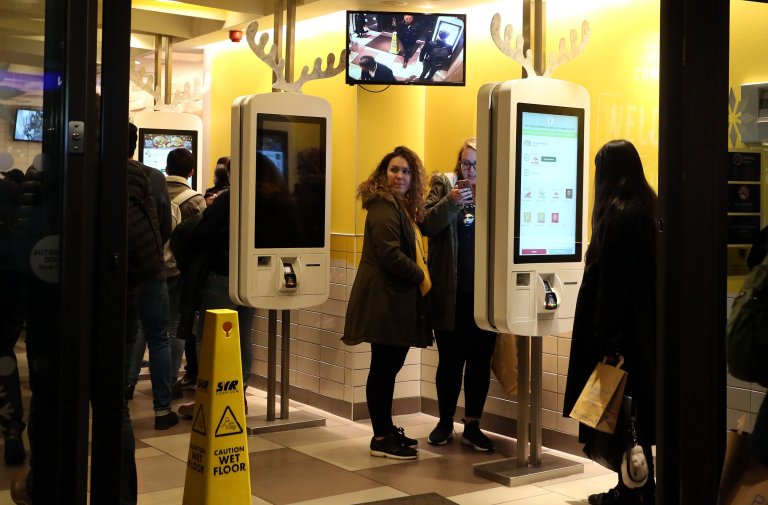
The machines have been rolled out in McDonald’s branches across the UK (Picture: Susannah Ireland for metro.co.uk)
‘For instance Enterococcus faecalis is part of the flora of gastrointestinal tracts of healthy humans and other mammals. It is notorious in hospitals for causing hospital acquired infections.’
Unsuspecting diners choose their food on the touchscreens then head to the server to pick up their burgers more often than not without washing their hands.
A screen at one branch was found to have staphylococcus, a bacteria that can cause blood poisoning and toxic shock syndrome. Dr Matewele said: ‘Seeing Staphylococcus on these machines is worrying because it is so contagious. ‘It starts around people’s noses, if they touch their nose with their fingers and then transfer it to the touchscreen someone else will get it, and if they have an open cut which it gets into, then it can be dangerous.
‘There is a lot of worries at the moment that staphylococcus is becoming resistant to antibiotics. However, it is still really dangerous in places like Africa where it can cause toxic shock.’ Metro.co.uk’s study with the university’s school of human sciences involved swabs taken from eight McDonald’s restaurants. Six in London and two in Birmingham. Listeria bacteria was found in Oxford Street and Holloway Road branches. It can cause listeriosis which can lead to miscarriages and stillbirths in pregnant women.
Dr Matewele said: ‘Listeria is another rare bacterium we were shocked to find on touchscreen machines as again this can be very contagious and a problem for those with a weak immune system.’ Three quarters of the screens swabbed showed traces of the bacteria proteus.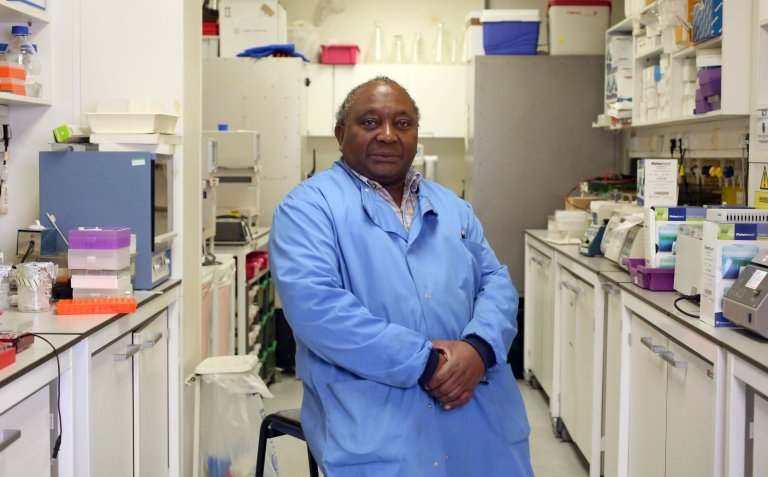 Dr. Paul Matewele , microbiology and immunology expert, was shocked at the findings (Picture: Susannah Ireland for metro.co.uk)
Dr. Paul Matewele , microbiology and immunology expert, was shocked at the findings (Picture: Susannah Ireland for metro.co.uk)
Dr Matewele said: ‘Proteus can be found in human and animal faeces. It is also widely distributed in soil. It can cause urinary tract infections and is also one of the hospital acquired infections where it may responsible for septicaemia. ‘Klebsiella is also from the gut and mouth, they are associated with urinary tract infections, septicemia and diarrhoea. Some species can infect the respiratory tract resulting in pneumonia.’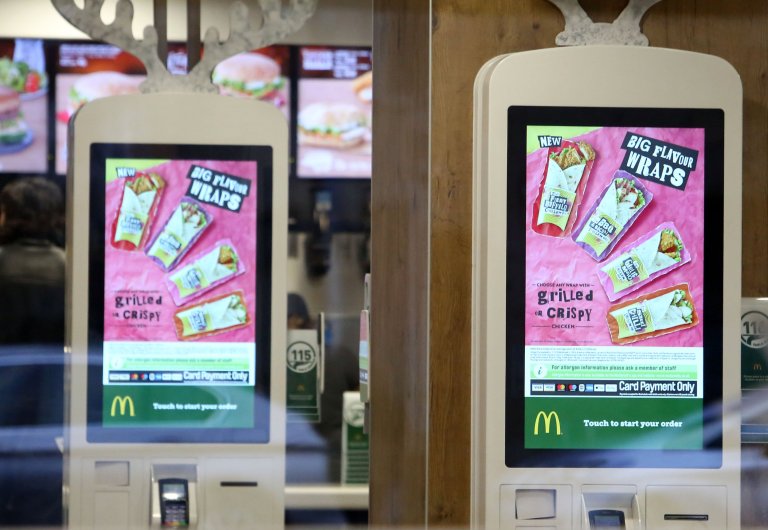 Touchscreens at Holloway Road, McDonald’s where listeria and other bacteria were found (Picture: Susannah Ireland for metro.co.uk)
Touchscreens at Holloway Road, McDonald’s where listeria and other bacteria were found (Picture: Susannah Ireland for metro.co.uk)
(Metro)
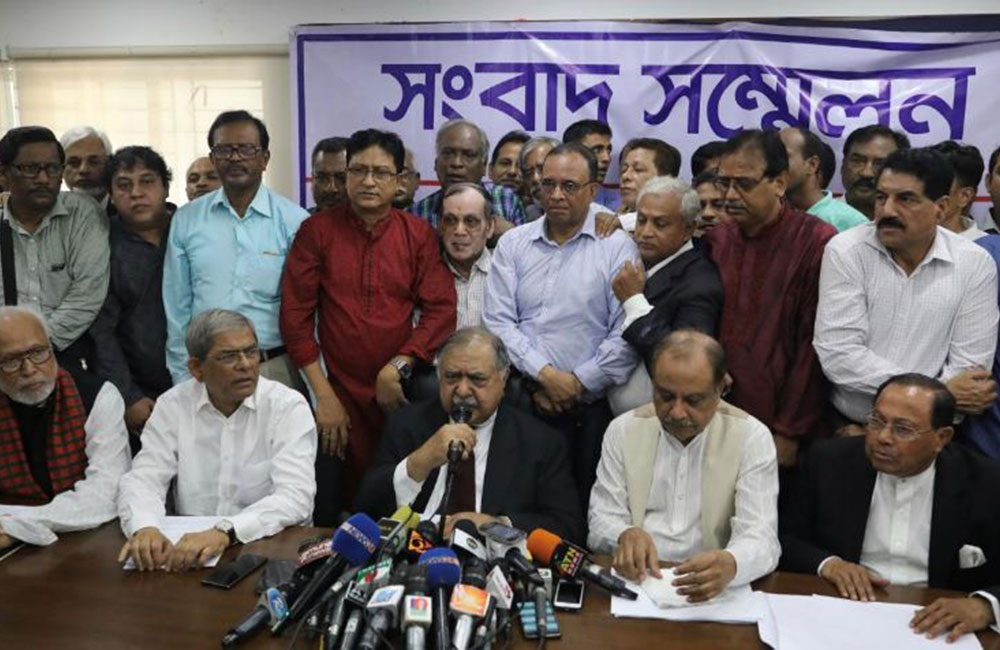
Bangladesh opposition alliance to contest polls 'to rescue democracy'
DHAKA (Reuters) - A group of opposition parties in Bangladesh, including the Bangladesh Nationalist Party (BNP), said on Sunday it plans to contest the Dec. 23 general election, despite the ruling party last week rejecting a series of its demands.
The Jatiya Oikyafront, a 20-party alliance led by 81-year-old Dr Kamal Hossain, had in particular wanted a caretaker government to take over in the weeks heading into the polls. The BNP says a caretaker government is essential for free and fair elections, but the ruling Awami League says the demand is unconstitutional.
The BNP, which is in disarray following the jailing of its chief, former prime minister Khaleda Zia, on corruption charges, had also pressed for a caretaker government at the 2014 election and boycotted it after the demand was not met. The last election was marred by deadly violence and shunned by international observers as flawed.
Prime Minister Sheikh Hasina’s government is seeking to be reelected for a third successive term.
“With the aim of rescuing democracy and a continuation of the movement to sustain a democratic process, Jatiya Oikyafront decided to participate in the election,” said Hossain in a statement, following days of deliberations with alliance members.
Hasina’s government has won widespread global plaudits for letting in hundreds of thousands of Rohingya refugees who fled persecution in Myanmar, but its critics have decried Hasina’s increasingly authoritarian rule. In particular, they have attacked her for the government’s heavy-handed handling of student protests this year and its crackdown on free speech.
While announcing the election date on Thursday, K.M. Nurul Huda, the head of Bangladesh’s Election Commission, urged all parties to participate in the election “to make it meaningful”.
Hasina and Khaleda, who between them have ruled Bangladesh for decades, are bitter rivals and the BNP says its leader has been jailed on trumped-up charges to keep her out of politics.
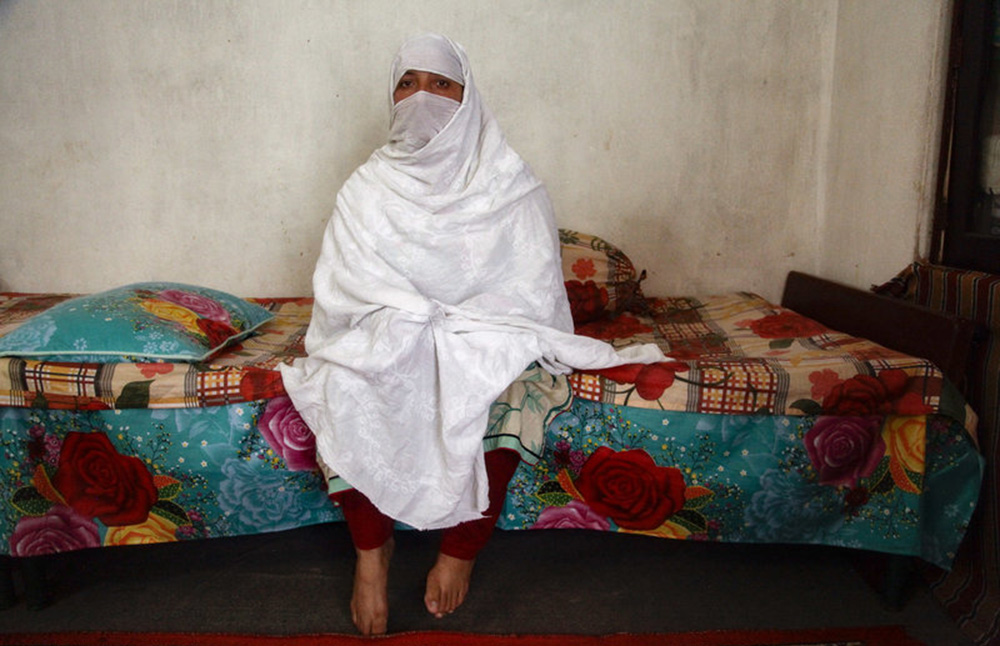
Why The Abortion Rate In Pakistan Is One Of The World's Highest
When at 19 Mehnaz became pregnant for the fifth time, she panicked. She already had four daughters, and her husband was threatening to throw her out if she had another. So she did what millions of Pakistani women do every year: She had an abortion.
Like many of those women, her abortion was partly self-administered. "I kept taking tablets — whatever I laid my hands on," she says. "I lifted heavy things" — like the furniture in her tiny living room. She drank brews of boiled dates — many Pakistanis believe the beverage triggers labor.
Mehnaz says she felt "a terrible pain in my stomach." Her husband took her to a midwife, who told him the baby was dead. "She gave me injections and it came out," Mehnaz says.
That was eight years ago. Since then she has had two more abortions, each time because she feared the baby would be a daughter.
Mehnaz, whose last name is being shielded to protect her identity, is one of millions of Pakistani women who have abortions each year. The deeply conservative Muslim country is estimated to have one of the highest rates of abortion in the world, based on a 2012 study by the New York-based Population Council, a nonprofit that advocates family planning. The rate that year was 50 abortions for every 1,000 women aged 15 to 44 — roughly four times higher than in the U.S.
According to family planning researchers, abortion provisions in the country's penal code are vague. The procedure is "legal only in very limited circumstances," notes the Guttmacher Institute.
The circumstances include a pregnancy that is dangerous to a woman's health — or if there is a "need" for abortion, according to Zeba Sathar, the Pakistan director of Population Council, and Xaher Gul, a Karachi-based public health policy expert and lecturer who advises nonprofits. But what constitutes a "need" is not defined, they say.
What's more, hospitals generally refuse to perform an abortion because most doctors believe it is illegal, Sathar and Gul say. Even when doctors know abortion is allowed in certain circumstances, they cite their own cultural beliefs to not undertake abortions except in urgent cases — for example, if a woman walks in with "an incomplete abortion," Gul says.
That has left Pakistani women at the mercy of back-alley abortion providers.
Some of these women, like Mehnaz, will abort a fetus if they fear they are carrying a female child, who can be seen as an economic burden. But that's not the only reason.
Pakistani women largely seek abortions because they either don't know about contraception or cannot access reliable contraception — or they've stopped using contraception after suffering complications, Sathar says. According to her research, most of the women who seek abortions are married, poor and already have children. Only 30 percent of fertile-age women use modern contraceptives, according to a 2017 U.N. report.
"We found to our surprise that most of the women had more than three children, maybe as many as five," Sathar says. "They were almost all — 90 to 95 percent — married. They were older, so they tended to be poorer, less educated."
Pakistan's high abortion and low contraception rates reflect a family planning policy in shambles, says Abdul Ghaffar Khan, director general of Pakistan's population program wing. His office is meant to set the national family planning agenda, but Khan described the situation as "a bureaucratic mess."
Family planning used to be the job of the federal government, but approval for a national policy languished for years.
In 2011, national authorities passed the matter to provincial governments. But at the provincial level, family planning is not part of the health ministry's portfolio. It is part of a different office and has long been neglected and underfunded, Khan says.
That means women aren't advised about contraception or supplied contraceptives when they are most amenable: after childbirth, receiving postnatal care or immunizing their babies, says Sathar of the Population Council. She described it as one of the chief "structural flaws of how we provide family planning."
The issues with family planning are partly why Pakistan has one of the world's fastest population growth rates, says demography expert Mehtab Karim, vice chancellor at Malir University of Science and Technology in Pakistan. That population boom has strained Pakistan's land and water resources, crowded its schools, outstripped development plans and may lead to more instability in this nuclear-armed state. "It has a tremendous impact," Karim says.
But changes may be coming. On July 4, Pakistan's Supreme Court demanded hearings into the country's family planning failures. A national policy may be put into action in the coming months, Khan says.
All this is too late for Mehnaz, who was married at 13 to her cousin in their tiny village and had four daughters in quick succession and seven children in all — six girls, one son. And three abortions. She is illiterate and said she didn't know anything about sex or contraception early in her marriage.
In a group interview with NPR, about a dozen midwives who also provide abortions said they would only help a woman who already appeared to be miscarrying — like Mehnaz, who induced her own abortion before seeking help.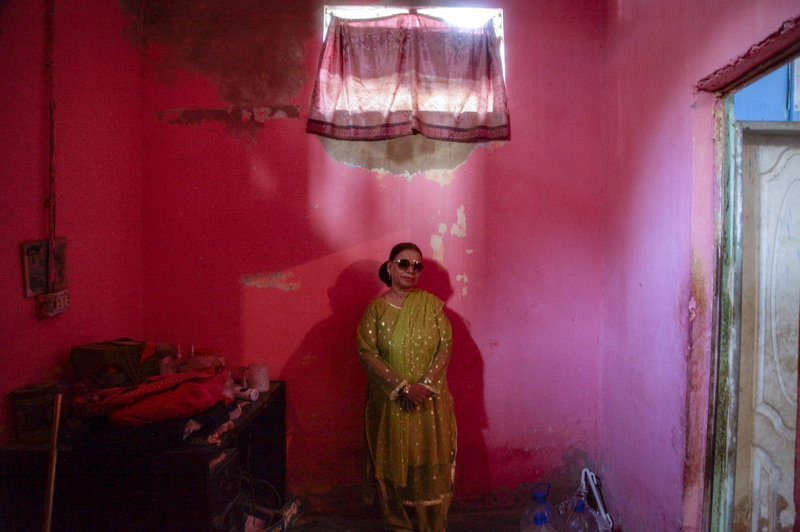
Mumtaz Begum, 60, stands in her clinic in Karachi, Pakistan. Begum says a midwife taught her how to induce abortions using medications freely available in Pakistan. Citing her religious faith, she says she would only help women who she believed were already miscarrying. Diaa Hadid/NPR
"I don't help with murder," says Mumtaz Begum, a 60-year-old who lives in a slum in the port city of Karachi. She has no medical qualifications but says a midwife taught her how to induce abortions decades ago, using medications freely available in Pakistan.
On a recent day, Begum showed NPR those pills and injections. They were clustered on a dusty table alongside religious texts and a bag of onions in a dank room with peeling paint. The gurney where she treated women was littered with clothing. "I wipe it down before women come in," she says.
Because many providers aren't properly qualified, researchers estimate about a third of all women who undertake abortions in Pakistan suffer complications, ranging from heavy bleeding to a perforated uterus and deadly infections.
Health workers do reach out to women to provide information about family planning. Some 130,000 women are employed by provincial health ministries to do house visits across the country, teaching about birth control.
But Gul says health workers are poorly trained and in short supply. Budgetary shortages, supply problems and corruption mean they often don't have contraceptives, or distribute expired contraceptives — and that there's little follow-up on how to use them.
Mehnaz was paid a visit by two such workers. She says they gave her an injection meant to prevent conception for three months. She became pregnant again anyway. As before, she tried taking pills to induce an abortion but says they made her sick so she stopped taking them.
Three years ago she had her seventh child, a girl. She then tried taking the pill, offered by the visiting health workers.
She says it made her dizzy and she stopped taking it.
She again became pregnant but miscarried — and pleaded with doctors to sterilize her.
She says they told her she had to wait until she was 40 — or get a permission slip from her husband. He refused: "He says he can't sign this, it's a sin."
She says he also refuses to use condoms or to stop having sex with her.
If she has another girl, her husband may well abandon her. If she tries to induce another abortion, her health could deteriorate.
"I am stuck," she says. Ther are many instances that can be taken into account that we have taken into that can be taken into account as far they are concerened
(NPR)

Trump on pace to surpass 8 years of Obama's travel spending in 1 year
Donald Trump's travel to his private club in Florida has cost over an estimated $20 million in his first 80 days as president, putting the president on pace in his first year of office to surpass former President Barack Obama's spending on travel for his entire eight years.
The outsized spending on travel stands in stark relief to Trump's calls for belt tightening across the federal government and the fact that he regularly criticized Obama for costing the American taxpayer money every time he took a trip.
Given variations in each trip, estimating the security costs around a presidential trip is difficult. But a 2016 Government Accountability Office report about a four-day trip Obama took to Florida in 2013 -- one similar to Trump's trips -- found the total cost to the Secret Service and Coast Guard was $3.6 million.
To date, Trump has spent six weekends -- and a total of 21 days -- at Mar-A-Lago, his private Palm Beach club. The total estimated costs for those trips are around $21.6 million.
Obama, by contrast, spent just under $97 million on travel in his eight years as president, according to documents reviewed by Judicial Watch, a conservative government watchdog. These trips included personal trips - including ski trips to Aspen and the Obama's annual family vacation in Martha's Vineyard, Massachusetts -- and work trips, like a visit to Everglades National Park on Earth Day in 2015.
Trump's frequent weekend travel makes it all but certain the 45th President will surpass Obama's spending in his first term, likely within months.
The spending comes as Trump asks the federal government to slash non-defense spending by $54 billion, including deep cuts to the State Department, the Department of Housing and Urban Development, the Environmental Protection Agency and the wholesale elimination of other federal programs. The proposed cuts, which are unlikely to be adopted in total, will correspond with $54 billion in increases to defense spending.
Trump's frequent trips to Florida will likely end soon. Businesses in Palm Beach County have been told to expect the president to visit through May, but that Trump will likely stop visiting after that because the weather in the area begins to get stiflingly hot.
Instead, many expect Trump will then start making frequent trips to his penthouse apartment at Trump Tower in New York City -- where first lady Melania Trump has been living for the first part of 2017 as their son, Baron, finishes school -- and his private Trump National Golf Club in Bedminster Township, New Jersey.
Trump is said to be particularly fond of his New Jersey property. Ivanka Trump was married there, and Trump used the country club as president-elect to put together his government after winning November's election. In a sign of his love for the club, Trump has expressed a desire to be buried on the property.But as much as the trips are a budget problem for Trump, they are also a public relations issue.
The president was an outspoken critic of Obama's travel, routinely slamming his predecessor on Twitter for his holiday trips home to Hawaii.
"The habitual vacationer, @BarackObama, is now in Hawaii. This vacation is costing taxpayers $4 milion +++ while there is 20% unemployment," Trump tweeted in 2011 with an incorrect unemployment figure.
Trump later tweeted: "President @BarackObama's vacation is costing taxpayers millions of dollars——Unbelievable!"High costs of security and travelDespite these comments, Trump and his family have proven to be an expensive first family to protect.Not only does Trump travel frequently, but New York City officials have said it costs between $127,000 to $146,000 a day to protect first lady Melania Trump when she is in New York and the president is not there.
Trump has yet to visit New York as president. The extensive needs of the Trump family have put strains staffing on the Secret Service, too.
Dozens of agents from field offices across the country, including New York, have been temporarily pulled off their normal criminal investigation duties to work two-week rotations protecting members of the large Trump family, Secret Service officials told CNN.
Homeland Security Secretary John Kelly said earlier this month that the Department of Homeland Security will ask for additional funding to protect Trump.
"They need a lot more agents, not just because of the Trump era, although that is additional because he has a lot of children and grandchildren," Kelly told senators on the Homeland Security Committee. "We need more agents and we need more uniformed personnel."
Kelly also acknowledged the strain the Secret Service is under.
"We need a larger Secret Service," Kelly said, "because we need to get some of these people a little bit of time at home with their families."
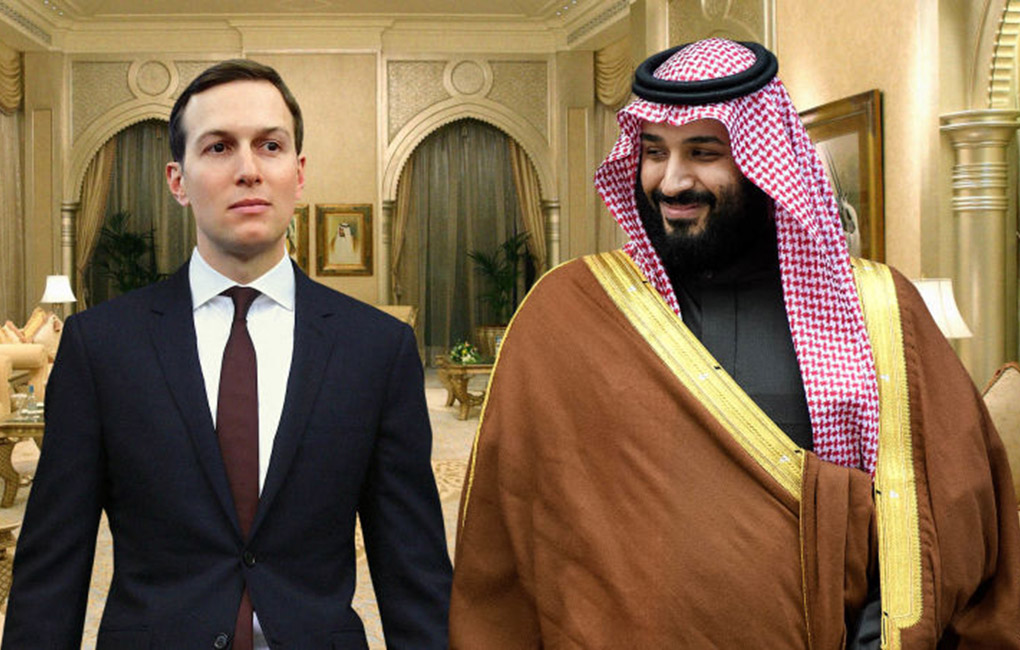
Kushner pressured US officials to inflate Saudi arms deal: Report
Trump's adviser and son-in-law sought to increase arms sales to 'symbolically solidify' US-Saudi ties, report says. 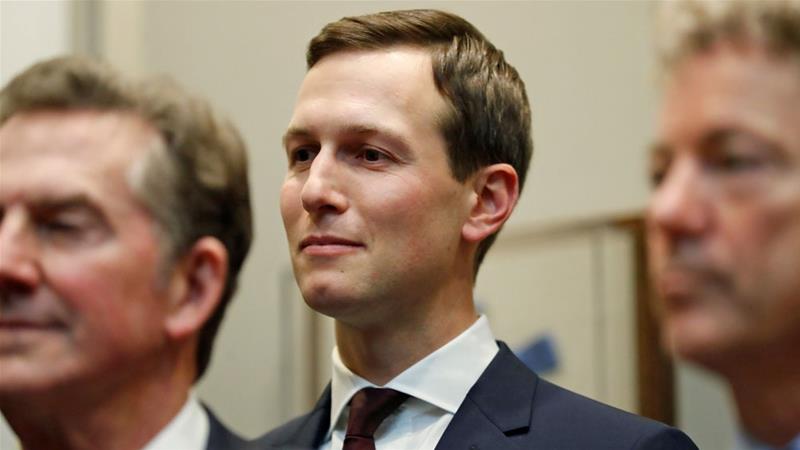
“We need to sell them as much as possible," Kushner told colleagues at a national security council meeting [Leah Millis/Reuters]
President Donald Trump's senior adviser, Jared Kushner, inflated arms sale figures to Saudi Arabia in order to strengthen Washington's relationship with the Gulf nation, according to an ABC News report.
Citing two officials and three former White House aides, the US network said on Monday that Kushner, who is also Trump's son-in-law, pressured US State and Defense Department officials to inflate numbers in his bid to "symbolically solidify the new alliance between the Trump administration and Saudi Arabia".
In May 2017, Washington and Riyadh inked a much-touted arms deal estimated at $110bn, a number that critics have long questioned.
The deal however, which was signed by Defense Secretary James Mattis and Crown Prince Mohammed bin Salman (MBS) in Riyadh during Trump's first official trip abroad, was a memorandum of intent with "very little legal weight".
"This document does not create any authority to perform any work, award and contract, 'issue articles from stock', transfer funds, or otherwise oblgate or create a binding commitment in any way either for the United States or the Kingdom of Saudi Arabia," the document, which ABC obtained of a copy of, states.
In the run-up to the summit, Kushner was quoted by a White House source as telling colleagues at a national security council meeting that "we need to sell them as much as possible".
Unwavering support Another source said there had been an ongoing debate between Kushner and officials at the Departments of Defense and State, respectively, to get a larger number because initially figures would only add up to 15bn.
Little progress has been made since the deal was reached however, with the Saudis so far having signed Letters of Offer and Acceptance (LOAs) valued at around $14.5bn for equipment, including helicopters, tanks, ships, weapons and training.
Riyadh has also passed on a September deadline to acquire the Terminal High Altitude Area Defense (THAAD) that comes with a price tag of $15bn.
According to ABC, many of the deals included in the memo lack details as to the type and quantity of equipment to be sold, some of which is not expected to be delivered until after 2022.
Kushner and Prince Mohammed developed a close working relationship since Trump's assumed office in January 2017.
Trump, meanwhile, has come out in support of MBS, dismissing a reported CIA assessment that the 33-year-old heir to the Saudi throne had ordered the killing of Saudi journalist Jamal Khashoggi at the country's consulate in Istanbul on October 2.
On November 20, Trump said he would not take any punitive measure against Riyadh, adding that a halt in arms sales to the kingdom's would allow China and Russia to fill the void.
"If we foolishly cancel these contracts, Russia and China would be the enormous beneficiaries," the president said.
(Al Jazeera)

Maldives ex-president returns from exile
The first democratically elected president of the Maldives returned home Thursday after more than two years in exile to escape a long prison term.
The plane carrying Mohamed Nasheed from Sri Lanka landed in Maldives' capital, Male, where he was welcomed by his party members and supporters. He planned to address his supporters later Thursday.
Nasheed was sentenced to 13 years in jail in 2015 after being convicted of terrorism for ordering the arrest of a top judge in 2012 while he was president. His trial was criticized internationally for lack of due process, along with those of many other political opponents jailed by strongman President Yameen Abdul Gayoom's administration.
He was offered asylum in Britain when he traveled there for medical treatment on leave from prison.
(Associated Press)
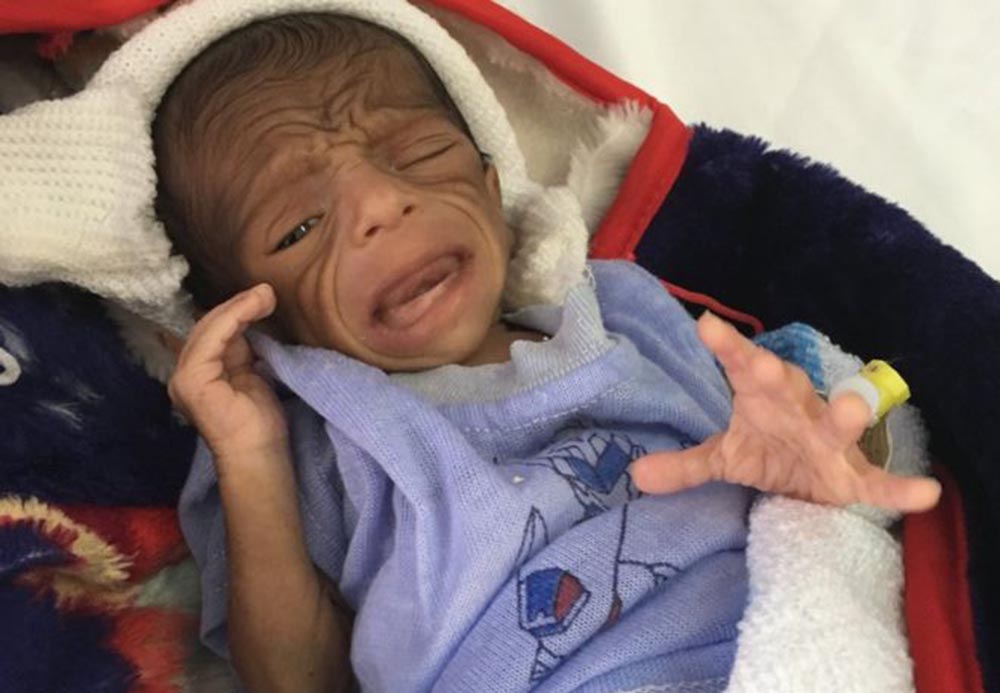
Yemen crisis: 85,000 children 'dead from malnutrition
An estimated 85,000 children under the age of five may have died from acute malnutrition in three years of war in Yemen, a leading charity says.
The number is equivalent to the entire under-five population in the UK's second largest city of Birmingham, Save the Children adds.
The UN warned last month that up to 14m Yemenis are on the brink of famine.
It is trying to revive talks to end a three-year war which has caused the world's worst humanitarian crisis.
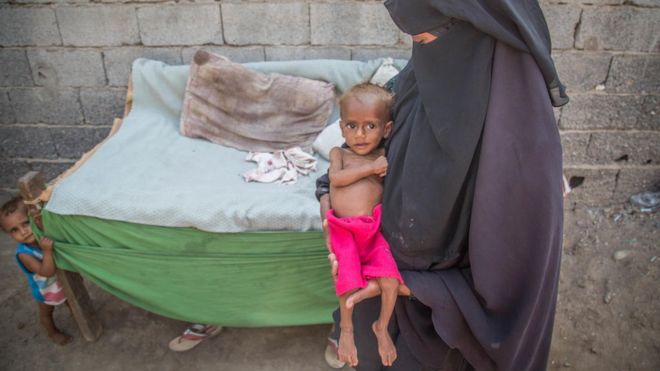
Children under the age of five are at greater risk of death from severe malnutrition. PIC :Mohammed Awadh/Save the Children
Yemen has been devastated by the conflict. Fighting escalated in 2015 when a Saudi-led coalition launched an air campaign against the Houthi rebel movement which had forced President Abdrabbuh Mansour Hadi to flee abroad.
At least 6,800 civilians have been killed and 10,700 injured in the war, according to the UN. The fighting and a partial blockade by the coalition have also left 22 million people in need of humanitarian aid, created the world's largest food security emergency, and led to a cholera outbreak that has affected 1.2 million people.
How did the charity work out the death toll?It is difficult to get an exact number of deaths. Aid workers in Yemen say many go unreported because only half of the country's health facilities are functioning and many people are too poor to access the ones that remain open.
Save the Children says it based its figures on mortality rates for untreated cases of Severe Acute Malnutrition in children under five from data compiled by the UN. According to conservative estimates, it calculated that around 84,700 children may have died between April 2015 and October 2018.
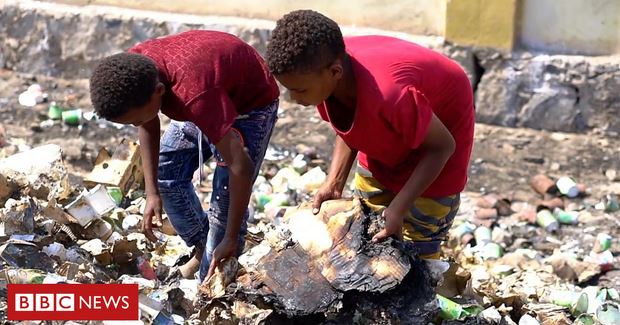
Rising food prices and the falling value of the country's currency as a result of a civil war are putting more families at risk of food insecurity.
The UK-based charity blames the blockade for putting more people at risk of famine, with continued heavy fighting around the principal lifeline port of Hudaydah further exacerbating the situation.
The rebel-held port, through which the country has traditionally imported 90% of its food, has seen commercial imports fall by more than 55,000 metric tonnes a month, the charity says. This is enough to meet the needs of 4.4m people, including 2.2m children, it adds.
Save the Children said it had been forced to bring supplies for the north of Yemen through its southern port of Aden, which has significantly slowed down aid deliveries.
What happens to the malnourished children?The charity says that based on historical studies, if acute malnutrition is left untreated, around 20-30% of children will die each year.
"For every child killed by bombs and bullets, dozens are starving to death and it's entirely preventable," its Yemen director, Tamer Kirolos, says.
"Children who die in this way suffer immensely as their vital organ functions slow down and eventually stop. Their immune systems are so weak they are more prone to infections with some too frail to even cry.
"Parents are having to witness their children wasting away, unable to do anything about it."
He further warned that an estimated 150,000 children's lives were endangered in Hudaydah with "a dramatic increase" in air strikes over the city in recent weeks.
One mother's ordealNusair, a 13-month-old boy, is among the children suffering from severe acute malnutrition who is being closely monitored by Save the Children.
He was treated in August but by October his health had deteriorated again.
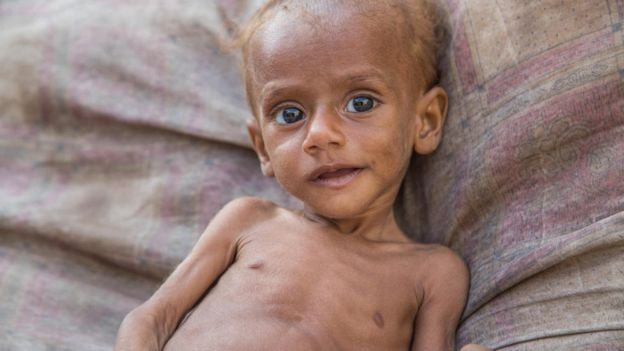
13-month-old Nusai. PIC: Mohammed Awadh/Save the Children
By that time he and his mother had been forced to relocate to a remote area due to increased fighting near their home and were unable to make the long trip to hospital.
"I can't go to sleep, it is torturing, and I am worried about my children. I couldn't live if any harm came to them," his mother, Suad, told the charity.
Isn't Yemen already suffering from famine?Not yet - but it's getting close.
Just last month, the UN warned that half the population of the war-torn country was facing "pre-famine conditions".
A country has to meet the following criteria to be declared in famine:
At least one in five households faces an extreme lack of foodMore than 30% of children under five are suffering from acute malnutritionAt least two people out of every 10,000 are dying every dayThe UN said - based on assessments from a year ago - the first two thresholds had either been exceeded or was dangerously close in 107 of Yemen's 333 districts.
But the third threshold about numbers of deaths was more difficult to confirm. The organisation is currently repeating the assessments.
What's the latest with the conflict?UN envoy Martin Griffiths is preparing to hold talks with the Houthi rebels in the Yemeni capital Sanaa on Wednesday in a bid to lay the groundwork for peace talks in Sweden.
It comes after a lull in violence was broken on Tuesday, with intense fighting erupting between the Saudi-led coalition and Houthi rebels in Hudaydah.
On Monday, the UK presented a draft resolution to the UN urging an immediate truce in the port city and giving both sides of the conflict a two-week deadline to remove all barriers to humanitarian aid.
Separately, Saudi Arabia and its ally, the UAE, have pledged $500m (£390m; €440m) in food aid, and say it is intended to reach 10 to 12 million Yemenis.
(BBC)
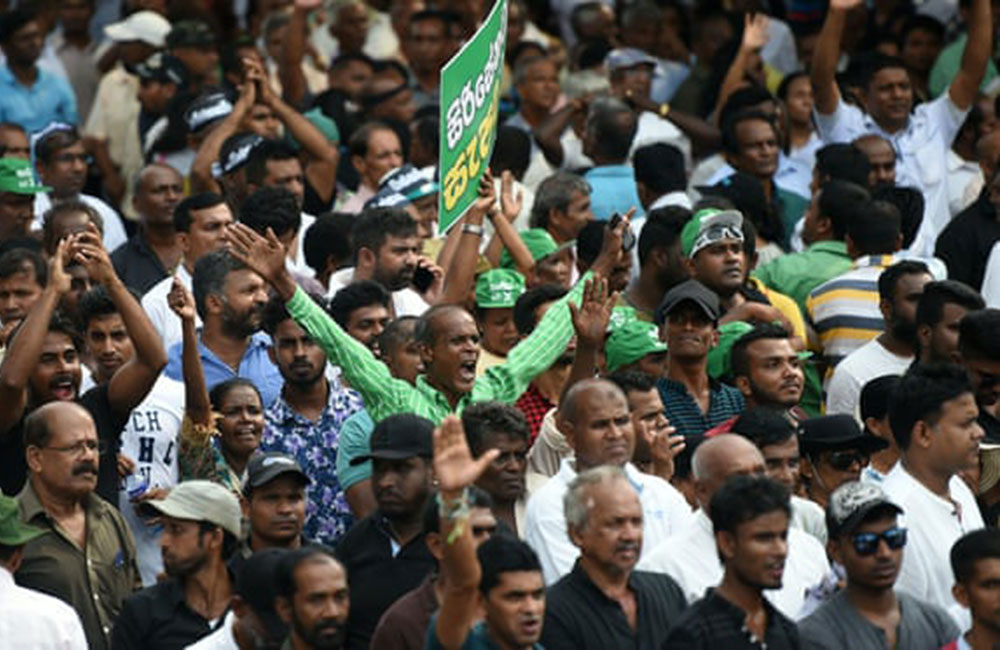
Sri Lanka crisis: activists fear end of human rights investigations
Ayesha Thajudeen was one of the first people on the scene of her brother’s accident. Police said Wasim, a Sri Lankan national rugby player, had crashed his car and burned to death inside. Surveying the charred vehicle, around 4am that morning, Ayesha wasn’t so sure.
The car was sitting in a ditch; it wasn’t clear what it had struck with enough force to burst into flames. Wasim’s wallet was nowhere to be found – a stranger later discovered it about 5km away. Strangest of all: Wasim was sitting in the passenger seat, she says.
“It was obvious from the moment I was taken to the site,” Ayesha says. “It was not a death, but a murder.”
The death of Wasim Thajudeen, 28, was one of several during the Mahinda Rajapaksa era in Sri Lanka to be reexamined by police after the strongman leader was defeated in 2015.
On Tuesday, tens of thousands of people rallied in Colombo against a decision by Sri Lanka’s president to dismiss the prime minister, Ranil Wickremesinghe, and install Rajapaksa in his place.
Wickremesinghe has refused to go and both he and Rajapaksa are rallying numbers in parliament to confirm them as the legitimate prime minister when the assembly resumes, currently scheduled for 16 November.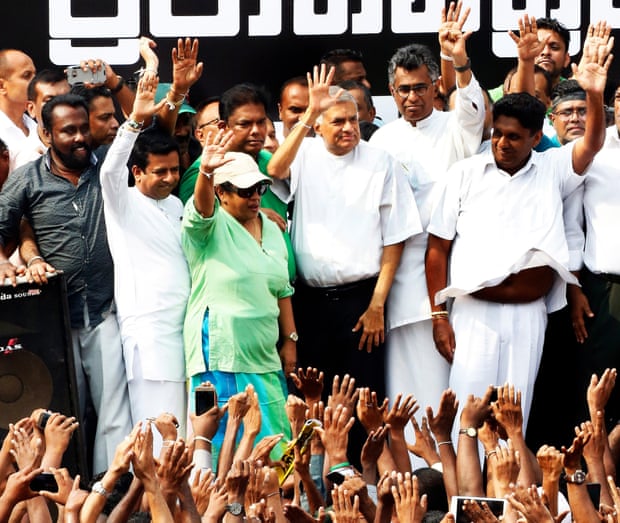
Former Sri Lankan leader Ranil Wickremesinghe acknowledges supporters at a rally in Colombo on Tuesday. Photograph: MA Pushpa Kumara/EPA
Activists fear Rajapaksa’s return would mark the end of a series of investigations, including under a UN human rights resolution, into crimes allegedly committed during his rule, and strain a post-civil war reconciliation process that was already stalling.
“The prospect of a Rajapaksa government is not good for accountability, democracy or human rights protection,” said lawyer Bhavani Fonseka, over the shouts of protesters in Colombo Plaza on Tuesday.
She said many of the investigations into Rajapaksa’s rule that commenced after he left office had dragged anyway in the past year. “But even those moving slowly are likely to stop if Rajapaksa comes back to government.”
Namal Rajapaksa, an MP and the former president’s son, said the family’s critics had nothing to fear. “We are telling all, my father is not in the habit of taking revenge,” he told the Guardian. “We will bring stability to the country, especially the economy and then go for elections.”
The current president, Maithripala Sirisena, defected from Rajapaksa’s government in 2014 to become the consensus candidate of the opposition. He framed himself as the alternative to a government accused of corruption, disappearing dissidents into white vans and intimidating the media.
Sirisena’s victory the following year was welcomed as a new page for Sri Lankan human rights and for relations between the country’s Buddhist majority and Tamil population after a 27-year civil war.
His government relaxed the pressure on media and NGOs, promised to end abuses by security agencies and co-sponsored a UN resolution whose demands included international trials for soldiers accused of wartime atrocities. It also agreed to reopen the investigation into the death of Wasim Thajudeen.
Members of the new government claimed Thajudeen had been murdered by Rajapaksa’s security forces, possibly after falling out with members of the family. Rajapaksa has denied the claims and says they are politically motivated.
The new probe initially raised Ayesha’s hopes. But in the past year the investigation has become bogged down in bureaucratic and legal delays. She believes the case is being deliberately slowed. “I feel very sad,” she says. “I don’t think I’m going to see an end to this.”
The progress of the Thajudeen investigation reflects a wider lack of government action on human rights issues. Lawyers such as JC Weliamuna blame the fact the same Rajapaksa-era military and civilian bureaucrats remained in place in the new government.
“There was political will, but there was no bureaucratic will,” Weliamuna says.
The government also faced resistance from within. He says ultranationalist forces within Sirisena’s administration have fought efforts to comply with the UN investigation. Similarly, “elitist forces” inside Wickremesinghe’s more business-friendly party have delayed financial reforms, he says.
“Every time there was a move for reform, it was challenged within the government, as well as outside,” he says. “People feel terribly let down.”
In the northern and eastern areas still recovering from the war, there is bitter disappointment over the absence of progress in settling displaced people, ending the excesses of security forces or drawing down the military.
In July, Sri Lanka was slammed by a UN special rapporteur for failing to comply with its commitments under the UN resolution it promised to implement.
“There is a sense of apprehension here,” says Ravindra de Silva, head of the Association for Friendship and Love, a youth group based in the northern town of Vavuniya. “People are waiting to see what happens next, who will be in control and what kind of changes there will be.
“Nothing decisive has taken place when it comes to reconciliation and other related issues like the missing, so there was disappointment anyway. Now that has turned into a sense of betrayal and foreboding that the old ways might return.”
Rajapaksa’s return could raise questions over key trials of family members and associates scheduled for the coming weeks: one against his brother, Gotabaya, who was a feared defence secretary during the previous government, and another of his former chief of staff.
Also potentially under question would be post-war reconciliation agencies such as a new office dedicated to tracing the up to 20,000 people who went missing during the war, and another established to decide on reparations.
A senior officer inside one post-war reconciliation agency told the Guardian he feared his work would be quietly strangled. “Political will matters,” he said. “Our funding is allocated within government budgets, so any downward trend in funding would have an impact.”
Ayesha Thajudeen says she has all but given up hope of finding out who killed her brother. And if Rajapaksa returns to power? “We will never know,” she says.
(The Guardian)
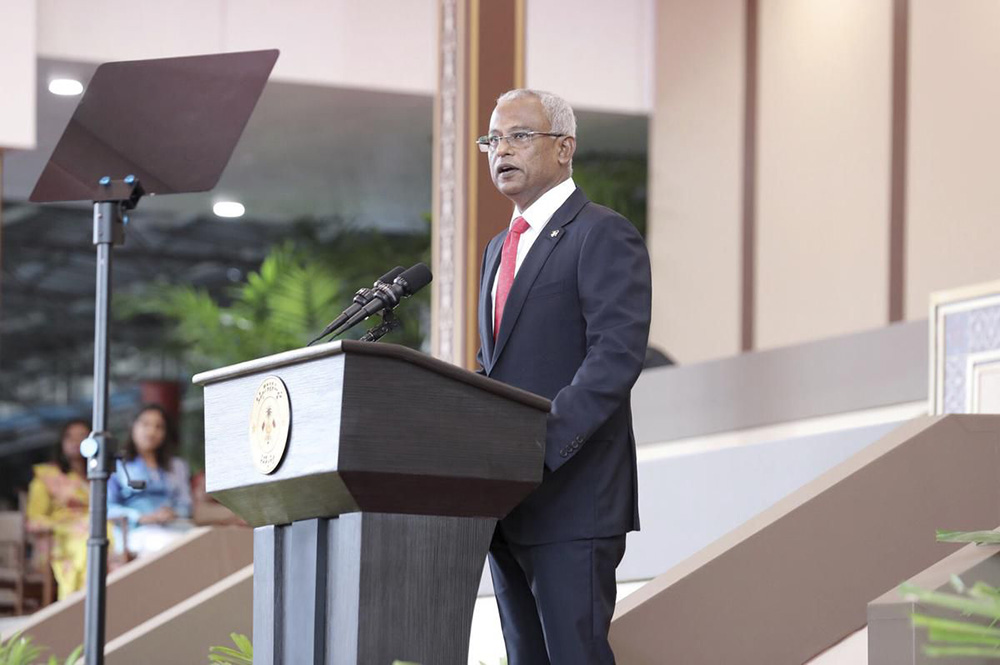
Maldives to rejoin Commonwealth
The new president of the Maldives has decided that the country will rejoin the Commonwealth group of former British colonies following a two-year absence, his office said a statement Monday.
The decision was made Monday after the Cabinet of President Ibrahim Mohamed Solih's recommended the move, the statement said.
Former strongman Yameen Abdul Gayoom pulled the Maldives out of Commonwealth in 2016.
He had accused the group of interfering with the country's internal affairs after it raised concerns over democracy and human rights.
Solih's ministers believe being part of the 53-member Commonwealth will provide young Maldivians with opportunities to get educational scholarships and for the country's athletes to play internationally.
"Moreover, the Cabinet ministers noted the importance of Maldives being a member of the Commonwealth, especially in keeping in line with other members of the international community with regard to upholding and promoting human rights, freedom of expression, and democracy," the statement said.
Solih defeated Gayoom in September's presidential election.
Maldives was a British protectorate until 1965 but did not inherit a full parliamentary system unlike other former colonies.
It remained largely under single party rule for decades until it became a multiparty democracy in 2008. Yameen rolled back many of the democratic gains after he was elected in 2013. (AP)
Apple and Samsung fined for deliberately slowing down phones
Apple and Samsung are being fined €10m and €5m respectively in Italy for the “planned obsolescence” of their smartphones.
An investigation launched in January by the nation’s competition authority found that certain smartphone software updates had a negative effect on the performance of the devices.
Believed to be the first ruling of its kind against smartphone manufacturers, the investigation followed accusations operating system updates for older phones slowed them down, thereby encouraging the purchase of new phones.
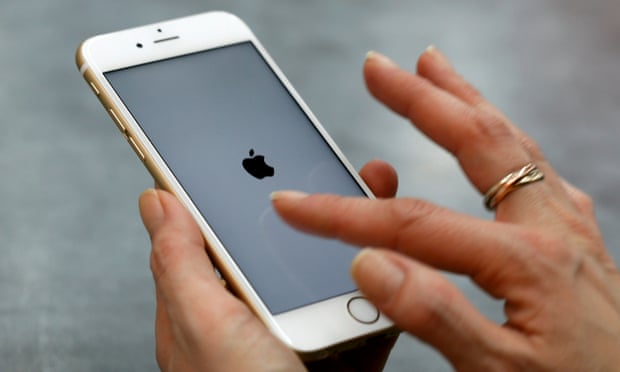
Apple and Samsung fined €10 and €5m respectively by Italian competition authority for slowing older phones with software updates. Photograph: Michaela Rehle/Reuters
In a statement the antitrust watchdog said “Apple and Samsung implemented dishonest commercial practices” and that operating system updates “caused serious malfunctions and significantly reduced performance, thus accelerating phones’ substitution”.
It added the two firms had not provided clients adequate information about the impact of the new software “or any means of restoring the original functionality of the products”.
Samsung told owners of its Galaxy Note 4 phone to install a new version of Google’s Android operating system intended for the more recent Galaxy Note 7, but which users claimed rendered the old model sluggish.
Likewise, Apple told iPhone 6 owners to install an operating system designed for the iPhone 7, leading to problems for owners of the older model.
Both firms were issued the maximum fine of €5m each and ordered to display a notice on their Italian websites informing customers of the watchdog’s decision.
Apple was fined an additional €5m for failing to give customers clear information about “essential” characteristics of lithium batteries, including their average life expectancy, how to maintain them or eventually replace them in the firm’s iPhones.
Apple acknowledged in December that it had intentionally slowed iPhones with degraded batteries through software updates to avoid sudden shutdown problems, but denied it had ever done anything to intentionally shorten the life of a product.
The company later apologised for its actions and reduced the cost of battery replacements. It also added battery health information to iOS and allowed users to turn off the slowing down of the iPhone’s processor.
The Italian antitrust authority opened its investigation following customer complaints around the same time as a similar probe in France, which has yet to conclude.
It is a crime under French law to intentionally shorten the life of any product in order to promote sales. The French consumer protection agency has the power to fine up to 5% of annual turnover or impose a jail term.
Apple also faced questions from the US senate in January over the slowing of iPhones, and a barrage of class-action lawsuits from around the country. More than 60 separate US lawsuits were ordered to be consolidated into a single suit in the Northern District of California, which is still ongoing.
Samsung’s software updates for its phones have not previously been questioned.
A Samsung spokesperson said the company was disappointed by the decision and intends to appeal the fine: “Samsung did not issue any software update that reduced the Galaxy Note 4’s performance. In contrast, Samsung has always released software updates enabling our customers to have the best experience possible.”
(The Guardian)
Page 16 of 41